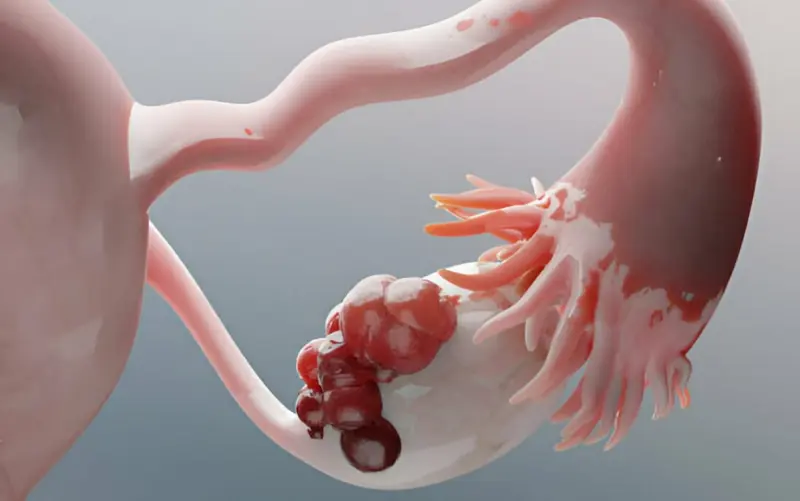When it comes to female fertility, the ovaries play a crucial role in determining reproductive potential. One key aspect that often gets overlooked is ovary size. Many women wonder whether the size of their ovaries has an impact on their ability to conceive. In this article, we’ll explore the relationship between ovary size, egg quality, and overall fertility to provide clear, science-backed insights.
Understanding Ovary Size and Its Role in Fertility
Ovaries are small, oval-shaped organs that store and release eggs for fertilization. The average ovary measures between 3 to 5 cm in length, but this size can vary based on age, hormonal health, and individual factors. Generally, a healthy ovary contains a good number of follicles, which are fluid-filled sacs housing immature eggs.
A decrease in ovary size may indicate a lower ovarian reserve, which refers to the number and quality of eggs a woman has left. Women are born with approximately 1 to 2 million eggs, but by puberty, this number drops to about 300,000 to 500,000. With age, both the quantity and quality of eggs decline, making ovary size a potential marker of fertility.
How Ovary Size Affects Egg Quality
1. Smaller Ovaries May Indicate Lower Egg Reserve
Studies have shown that women with smaller ovaries tend to have a lower antral follicle count (AFC) and anti-Müllerian hormone (AMH) levels, both of which are strong indicators of ovarian reserve. AMH levels typically range from 1.0 to 4.0 ng/mL in healthy reproductive-age women. Low AMH levels (below 1.0 ng/mL) are often associated with diminished ovarian reserve, which can reduce the chances of conception.
2. Egg Quality Declines With Decreasing Ovarian Reserve
A high ovarian reserve is linked to better egg quality. Eggs from a woman with a healthy ovarian reserve have a better chance of successful fertilization and implantation. Conversely, women with diminished ovarian reserve (often indicated by smaller ovaries) may experience a higher rate of chromosomal abnormalities, leading to difficulties in conceiving or an increased risk of miscarriage.
3. Impact on IVF Success
For women undergoing in vitro fertilization (IVF), ovary size can influence the number of eggs retrieved during stimulation. Research suggests that women with smaller ovaries produce fewer eggs in response to fertility treatments, which may lower IVF success rates. However, quality remains key—one good-quality egg can lead to a successful pregnancy, even if the quantity is low.
Causes of Small Ovaries and Their Effect on Fertility
Several factors contribute to reduced ovary size and function:
Aging: After age 35, ovarian reserve declines more rapidly.
Polycystic Ovary Syndrome (PCOS): While women with PCOS often have larger ovaries, irregular ovulation can impact egg quality.
Primary Ovarian Insufficiency (POI): A condition where ovaries stop functioning normally before age 40.
Endometriosis: Can cause ovarian cysts (endometriomas) that affect ovarian function.
Medical Treatments: Chemotherapy and radiation can damage ovarian tissue, leading to reduced size and function.
Genetic Factors: Some women are naturally born with lower ovarian reserves.
Can You Improve Ovary Health and Egg Quality?
While ovary size cannot be increased, certain lifestyle changes and treatments can support ovarian health and egg quality:
Healthy Diet: A diet rich in antioxidants, folic acid, omega-3s, and CoQ10 may improve egg quality.
Regular Exercise: Moderate exercise supports hormonal balance but excessive workouts may negatively affect ovulation.
Managing Stress: Chronic stress can disrupt reproductive hormones.
Avoid Smoking & Alcohol: Both can accelerate ovarian aging.
Supplements: DHEA, vitamin D, and prenatal vitamins may help improve ovarian function.
Fertility Treatments: If you have a diminished ovarian reserve, options like IVF with egg freezing or donor eggs can help.
When to See a Fertility Specialist
If you are struggling to conceive or have concerns about your ovarian reserve, consulting a fertility specialist is crucial. Diagnostic tests such as AMH blood tests, ultrasound for antral follicle count, and hormone assessments can provide a clearer picture of your fertility status.
At New World Fertility, we specialize in personalized fertility treatments to help women optimize their reproductive health and increase their chances of conception.
FAQs
1. Can a woman with small ovaries still conceive naturally?
Yes, but it may depend on ovarian reserve and egg quality. Women with smaller ovaries may have a lower egg count but can still conceive with the right approach.
2. Does having large ovaries mean better fertility?
Not necessarily. While larger ovaries may contain more follicles, conditions like PCOS can interfere with regular ovulation and fertility.
3. What is considered a normal ovary size for fertility?
A normal ovary size is 3-5 cm in length, but fertility depends more on egg quality and ovarian reserve than just size alone.
4. Can ovarian reserve be increased?
While ovarian reserve cannot be increased, lifestyle changes, supplements, and fertility treatments can help improve egg quality and reproductive outcomes.
5. How does ovary size affect IVF success?
Women with smaller ovaries may produce fewer eggs during IVF stimulation, but a high-quality egg can still result in a successful pregnancy.
If you have concerns about your fertility, New World Fertility is here to help you with expert guidance and personalized treatment options.

 Oct-12-2025
Oct-12-2025